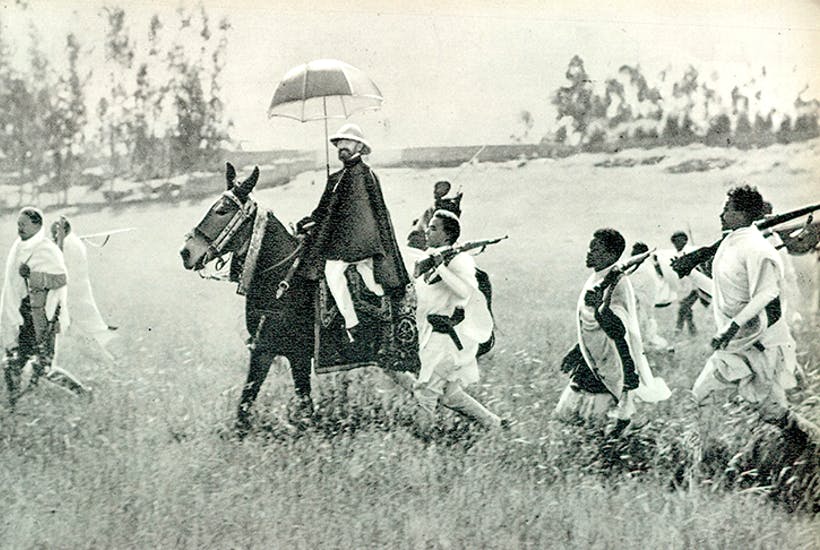In 1935 the troops of Benito Mussolini’s sinister-clownish Roman Empire II invaded Ethiopia, in large part out of spite for Italy’s embarrassing defeat there 40 years earlier.
Initially largely uncontested — thanks both to Emperor Haile Selassie’s desperate faith in international brotherhood and to a hearty dose of Quislingism from his leading nobles — when ‘war’ eventually did break out it was so one-sided that Ethiopian women were gathering spent bullet casings for reuse while Italian planes (the older Ethiopians believing these were dragons) dropped poison gas on them. Selassie, meanwhile, fled to England.
The case is made that women are by nature so inured to horror that war is just something they take in their stride
The conflict inevitably degenerated into guerrilla tactics on the one side and terrible reprisals on the other. Step forward Ettore Navarra in Maaza Mengiste’s novel, ‘an earnest young Venetian who has come into [the] army with a camera’, and whose colonel now instructs him to document the founding of this new Etiopia italiana. (Stand by for ‘shooting’ tropes.)
Step forward also Hirut, a highland servant girl, and other women from all levels of Ethiopian society, who reject their traditional wartime roles as nurses and corpse-buriers, and together manufacture the illusion — ‘shadow king’ — that the emperor has not abandoned his people and his country after all.
This being the story of an unremembered war, bedecked with referential trimmings of Old Testament, Homeric myth and Verdian opera, and book-ended by Victorian and Cold War military contexts, I had expected to enjoy The Shadow King a lot more. Alas, although it hardly frames itself as Abyssinian Andy McNab, this tale of ‘what it means to be a woman at war’ is overwhelmingly more about the former than the latter.
The book is avowedly seen by its author as an act of restitution to ‘those women and girls of Ethiopia …who stood up’ (her great-grandmother included), but the ramifications of this seem to have spiralled. The case is more or less made that women are by nature so inured to horror that war is something they can just take in their stride, and there is a lot of nose-tapping about what they ‘know’ of life (imagine this with gender roles reversed); the insanely murderous Italians are only fractionally more demonised than Hirut’s countrymen; and the prose inclines heavily to the poetical, quite often with a physical aspect to it —‘the battlefield is her own body’ — that will strain the patience of some (one might guess male) readers.
Ultimately, though, if the complaint is (and it is) that the official histories of this war leave out the women, then — given the freedoms inherent to a ‘work of fiction’ —The Shadow King strangely makes no substantive claim that there were armies (or even companies) of latter-day Amazons roaming the Ethiopian mountains, slaying enemies. As far as war per se is concerned, the roles of these few women remain, frankly, auxiliary.
From the strictly historical view, what’s more, the novel also implies — by near-total omission — that Ethiopian irregulars (of both sexes) won back their country through their unrelenting, native efforts. This chimes well with the proud, continuing claim of Ethiopia to be ‘the only African nation never conquered’, but might be news to the thousands of British and Imperial forces who entered Italian-held Ethiopia in 1940– 1, and thus restored the real Haile Selassie to his kingdom.






Comments